Education
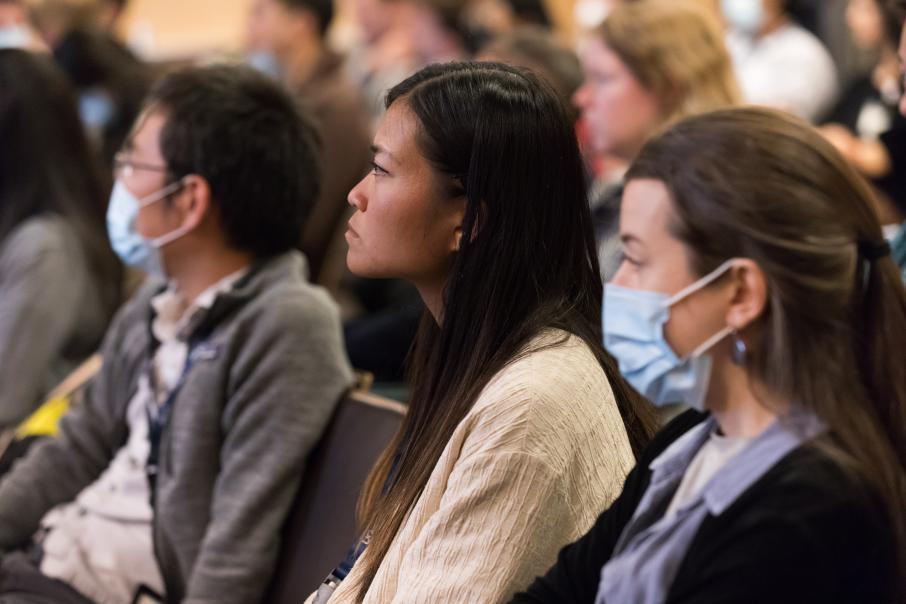
The UCSF Pediatric Medical Genetics Fellowship training program trains physicians in genomic-based medical care along with their primary residency. Our mission is to provide outstanding training in clinical genetics and to help each resident achieve personal and career goals in genetics.
Skip to Section:
About the Program
The first year of genetics training is largely clinical. The second year of training adds clinical laboratory training and the trainee's individual areas of interest.
Caring for patients with inborn errors of metabolism and genetic conditions are core elements of our program, along with prenatal genetics, cancer care, birth defects and genetic counseling. Our trainees learn to apply molecular testing, high-throughput sequencing, cytogenetic techniques, and comprehensive care for patients. The background of our residents is typically in pediatrics, internal medicine, obstetrics/gynecology, or family medicine, however physicians from many specialties are considered.
Individual work with attending physicians and multidisciplinary team-based teaching are emphasized. Genetics weekly rounds and metabolic conferences are opportunities for residents to discuss patients and medical management dilemmas. Didactic sessions also complement the learning environment, along with cutting-edge seminars in human genetics. Our trainees pursue scholarly projects in their area of interest in genomic medicine and attend national and regional meetings. The combination of faculty from pediatrics, internal medicine, obstetrics and gynecology and laboratory medicine provides a rich set of experiences.
How to Apply
The UCSF medical genetics residency is a two-year program for physicians who have already completed at least one year of training in an ACGME- accredited residency program in another primary specialty, e.g. pediatrics, internal medicine, obstetrics and gynecology, pathology, family practice. In addition, our residency program is also the medical genetics portion of the UCSF Maternal Fetal Medicine (MFM) fellowship training program, a joint program between the UCSF medical genetics residency and the Department of Obstetrics, Gynecology and Reproductive Sciences. The MFM fellows participate completely in the UCSF medical genetics residency and complete the same rotations and clinics as medical genetics residents.
Applications will be processed through the Electronic Residency Application Service (ERAS). If you are interested in applying for residency training in medical genetics at UCSF, please submit your common MyERAS application form along with the following documents via the ERAS system:
- Curriculum vitae
- Personal statement
- Minimum of three recommendation letters
Application Eligibility
Applicants from accredited residency programs in pediatrics and internal medicine and American citizens or legal residents of the US may apply. Others may contact the director or the administrator to determine eligibility for application.
For further information, please contact:
Natalie Maria
Education Program Manager
UCSF Department of Pediatrics, Medical Education
550 16th Street, 4th Floor, Box 0110
San Francisco, CA 94158
[email protected]
Hind Al Saif, MD
Program Director
[email protected]
Allison Tam, MD
Program Director, Pediatrics-Medical Genetics and Genomics Combined Residency
[email protected]
Program Leadership
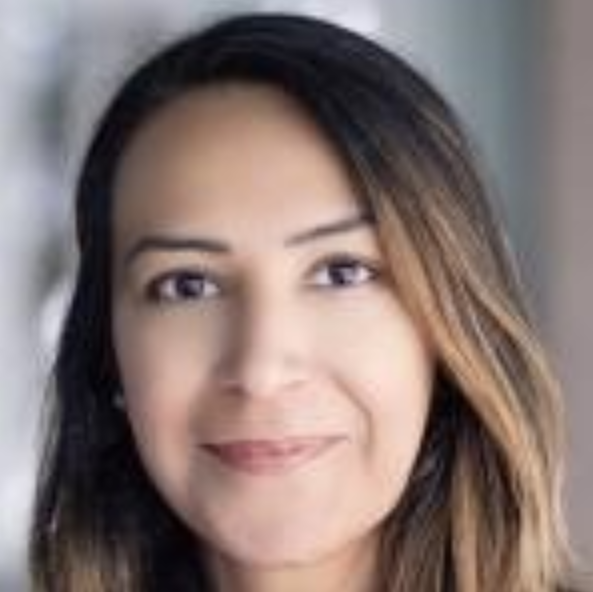
Hind Al Saif, MD
Program Director, Medical Genetics and Genomics Residency
[email protected]
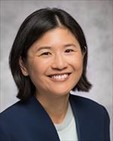
Allison Tam, MD
Program Director, Pediatrics-Medical Genetics and Genomics Combined Residency
[email protected]
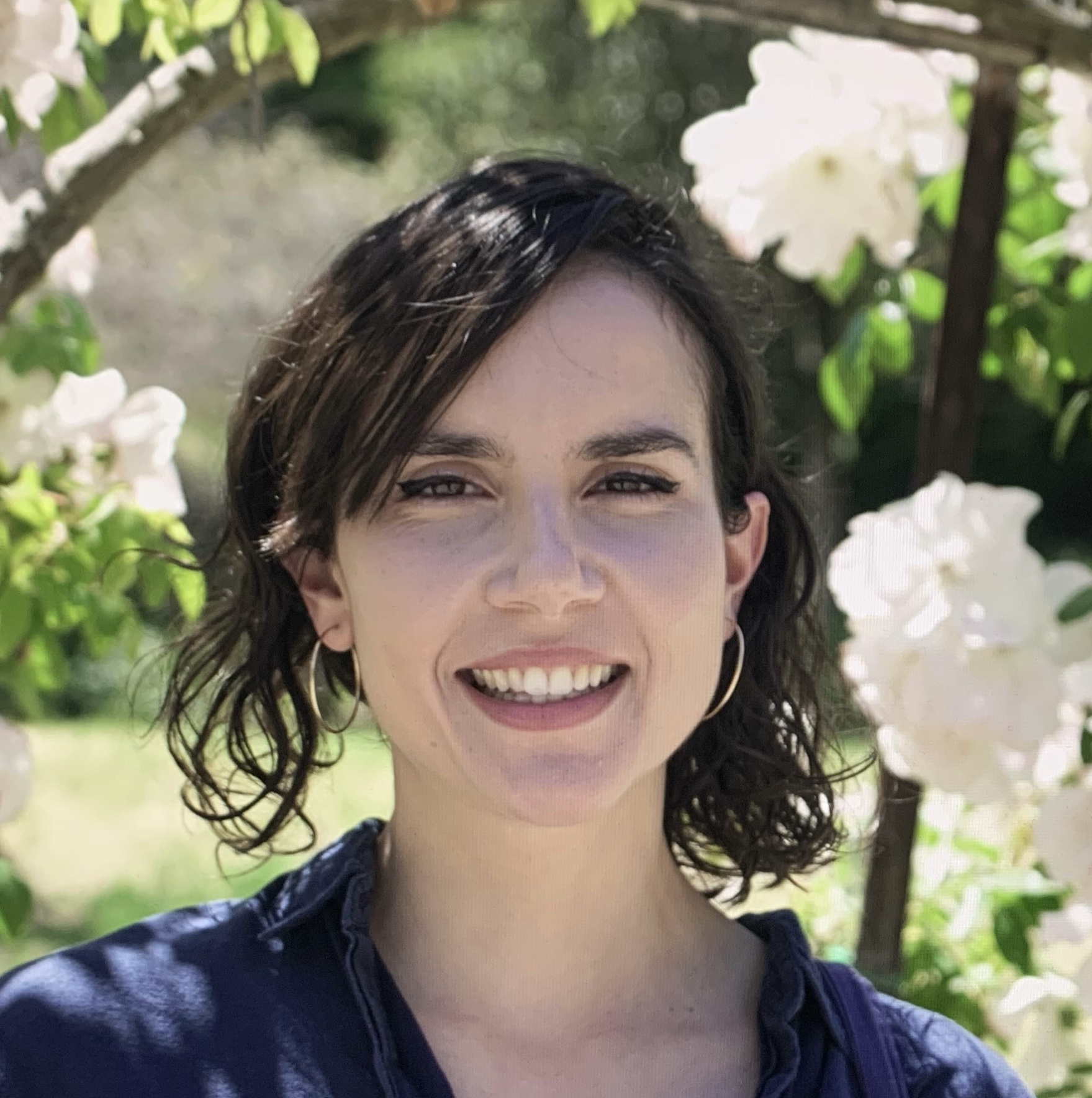
Natalie Maria
Program Manager
[email protected]
Curriculum
Clinical
Residents develop skills through a sequential educational program:
- Year one: During the first year of the program, the resident begins developing the skills and knowledge necessary for the critical analysis of clinical problems and the ability to make appropriate decisions. The resident attends a variety of medical genetics clinics, including General Genetics, Neurometabolic, Craniofacial, Ras/MAPK Pathway and Autism clinics, and rotates on the inpatient service at UCSF Benioff Children's Hospital. He/she is expected to become familiar with the medical genetics literature and other sources of pertinent information, to attain a knowledge of the methods and applications of genetic laboratory tests, and to begin to acquire the skills of interviewing and counseling patients. The resident is also expected to make contact with a laboratory or clinical research mentor and to begin to formulate a research project.
- Year two: During the second year of the program, the resident greatly broadens his/her ability to diagnose, manage, and counsel for a broad range of genetic disorders, including inherited metabolic diseases. In addition, the resident becomes familiar with prenatal and presymptomatic diagnosis and carries out a meaningful research project. Six months is allocated to research during the second year. There are a variety of research opportunities for clinical, translational and basic research in the medical genetics divisions of the departments of Pediatrics and Medicine, as well as in the Institute for Human Genetics (see Research Program). In many cases, it is appropriate that residents will continue for a third year of training in medical genetics, with heavy emphasis on research.
Laboratory rotations are incorporated in the schedule during the first and second years of residency. During the laboratory rotations the residents are expected to perform the following tasks:
- Cytogenetics: Residents carry out all steps from a blood sample to the karyotype; they prepare culture medium, set up cultures, carry out harvesting and slide preparation as well as subsequent banding and staining of chromosomes using the commonly employed methods (F-banding, Q-banding, C-banding). Residents practice karyotyping using normal and abnormal metaphase spreads. Residents learn to use ISCN nomenclature to describe normal and abnormal karyotypes. Residents apply in situ hybridization kits for FISH on metaphase and interphase cells, including individual FISH probes and subtelomeric probe analysis. Residents also learn about advanced methods (e.g. CGH). Residents participate in regular sign-out sessions of the laboratory where karyotype and molecular cytogenetics results are interpreted.
- Molecular Genetics: Residents learn the basis of procedures (Southern blot, reverse dot-blot, PCR, RT-PCR, automated microsatellite analysis and DNA sequencing) that are used for molecular diagnostics. Residents learn about the different types of tests as they are applied to specific disorders. At the end of the rotation, residents should be able to interpret and communicate primary laboratory results.
- Biochemical Genetics: Residents learn to carry out the routine methods available for biochemical screening tests. Residents learn the principles that underlie the more complex analytical procedures such as amino acid and organic acid analyses. Residents learn to interpret drug intake histories for interpretation of such results.
Research
The UCSF Medical Genetics Residency Program allocates six months during the second year of residency for research. Residents perform clinical research during their period of training or can begin a more basic project in the second year that can lead to a more extensive project in the laboratory of a mentor after finishing the two-year residency. For clinical research projects, the resident must design a clinical study and learn about aspects of ethical conduct in research involving human subjects. All trainees are required to take courses in the responsible conduct of science, and in authorship in biomedical publication. In addition, residents submit an application, including a consent form for adults and an assent form for minors if applicable, for review by the Institutional Review Board. Subsequently, residents participate in the informed consent process, ethical conduct of research, preparation of an abstract for presentation at professional meetings, and preparation of the manuscript for peer review at a reputable medical journal.
For residents interested in a more extensive research project, UCSF offers many opportunities. UCSF is home to world-class genetic researchers in most of its basic and clinical departments. Most significantly, UCSF has an interdepartmental organized research unit, the Institute for Human Genetics (IHG), led by Dr. Nadav Ahituv. The IHG plays an important role in coordinating research activities in human genetics that are carried out at different sites, programs, departments, and institutions beyond UCSF. The IHG has been instrumental in the establishment of a Genetic Studies Core Facility, a UCSF DNA Bank, and a Genome Core Facility, as well as in the recruitment of faculty geneticists to both clinical and basic science departments. Thus, there is a rich and expansive environment for research training at UCSF.
Progress in research is addressed at a semi-annual meeting of each resident with the program director and associate program director. In the first year of the program, this focuses primarily on identifying a research mentor and project.
Clinical Conferences
A variety of clinical conferences enrich resident education at UCSF.
Clinical Genetics Patient Conference (Weekly)
This weekly conference is routinely attended by all core faculty, genetic counselors, laboratory directors, rotation students/residents, PhD fellows, grant trainees and interested graduate students. All residents are required to attend this conference. The conference is a formal review of the patients evaluated that week in genetics clinics and in-house consultations. The residents/attendings/genetic counselors present the patients with the history and pertinent physical findings (including photographs when appropriate). In addition, cytogenetic, molecular and prenatal testing results of the past week are discussed. The resident on call leads the conference, including discussing recent inpatient consultations. The discussions are robust and include issues of differential diagnosis, disease biology, diagnostic testing, treatment, genetic counseling and basic science correlates. In this forum, the trainee gains experience in organizing and formally presenting medical genetic information, in leading the interactive discussions that ensue, and in addressing the questions and problems that arise in these discussions. Over the years, this conference has been a hub for medical care providers interested in clinical genetics from UCSF and nearby medical centers. An additional half-hour each week is devoted to didactic presentations on topics or journal articles of particular interest to attendees. All attendees (residents, fellows, faculty, genetics counselors, and students) participate in leading the presentation. Attendance at this conference is mandatory for all faculty and residents. All individuals attending the conference sign in at the beginning at the lecture.
Biochemical Genetics Conference (Weekly)
This weekly conference series, is attended by all residents (required attendance), the genetic counselors of the biochemical genetics service, the genetics nutritionists, and members of the medical genetics faculty. All attendees contribute presentations, including didactic lectures, journal club presentations, and case presentations with discussion of the biology, genetics, and medical aspects of the disorder. All individuals attending the conference sign in at the beginning of the lecture.
Fellows' College Workshop (Once Per Quarter)
The Fellows' College of the Department of Pediatrics is a professional development program which endeavors to provide all departmental academic fellows with the guidance and mentorship essential to prepare them to maximize their education, research and individual professional development during their fellowship years and to assist them in making a successful transition into their early careers as physician-scientists and academic clinician-educators. The primary goal is to provide specific information to allow fellows to acquire skills to navigate the complex world of academic medicine from fellowship through the early years of an academic career. The Fellows' College was developed to enhance the individual educational and professional development experiences that are available as part of the various subspecialty fellowship-training programs. The College consists of three half-day workshops held in the summer, fall, and spring of each year. In addition, our residents also participate in Pediatrics Research Day sponsored by the Fellows' College. Each session includes interactive introductory didactic talks and smaller topic-specific breakout sessions. All academic fellows participate in the program. Faculty and senior fellows from the Department of Pediatrics and the University act as lecturers, mentors, and leaders of breakout sessions. Our residents are required to attend these workshop sessions and are relieved from clinical duties during these sessions. Attendance at this workshop is mandatory and is recorded.
Neurogenetics Seminar. This conference is held monthly, under the direction of Dr. Bruce Miller of the Memory and Aging Center (MAC). Dr. Miller organized this seminar series to bring together members of the adult neurology MAC and movement disorders groups, with members of the pediatrics neurometabolic program. At the conference, a formal seminar on a research topic, or recent topic or paper of interest, is presented by faculty members or fellows of the adult and pediatrics groups, in rotation. The conference is attended by medical genetics and neurology trainees, faculty in clinical and basic human genetics, faculty in child and adult neurology, and genetic counselors, psychologists, and staff members of the two groups. Recent seminars have included talks on: sub-telomeric cryptic translocation screening in patients with neurodevelopmental delay of unclear etiology; non-Parkinson dystonia syndromes; the molecular genetics of neurodegeneration with brain iron accumulation; biochemical genetic disorders causing adult-onset dementias; and modifier genes and genetic complexity in Mendelian inborn errors. In the long term, it is hoped that this series will constitute an academic setting that will lead to faculty collaborations in educational endeavors and research, and eventually lead to the development of a formal neurogenetics training program.
NF/Ras Clinic Conference. Trainees in medical genetics attend the NF/RAS Clinic, and participate in a conference discussing patients from this clinic, which interfaces with the Cancer Risk Program and meets every 2-3 months.
Prenatal Diagnosis Meeting. This weekly meeting is attended by faculty and residents of the reproductive genetics group, genetic counselors, and medical genetics trainees during their prenatal diagnosis rotation. At this meeting, recent complicated cases are reviewed.
Fetal Treatment Meeting. Neonatologists, surgeons, radiologists, perintologists, and geneticists attend this daily meeting. Medical genetics trainees who are in their prenatal diagnosis rotation may attend this meeting, where complicated ultrasonographic findings are reviewed and prenatal treatment options and protocols are discussed.
Current Fellows
Current UCSF Residents in Medical Genetics
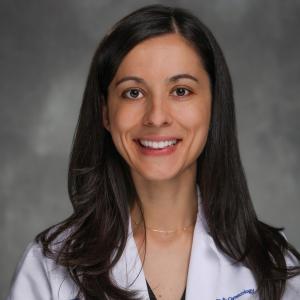
Carmen Santoli, MD
Training Period: 2024-2028
Medical School: Oregon Health & Science University School of Medicine
Residency: Duke University Hospital System
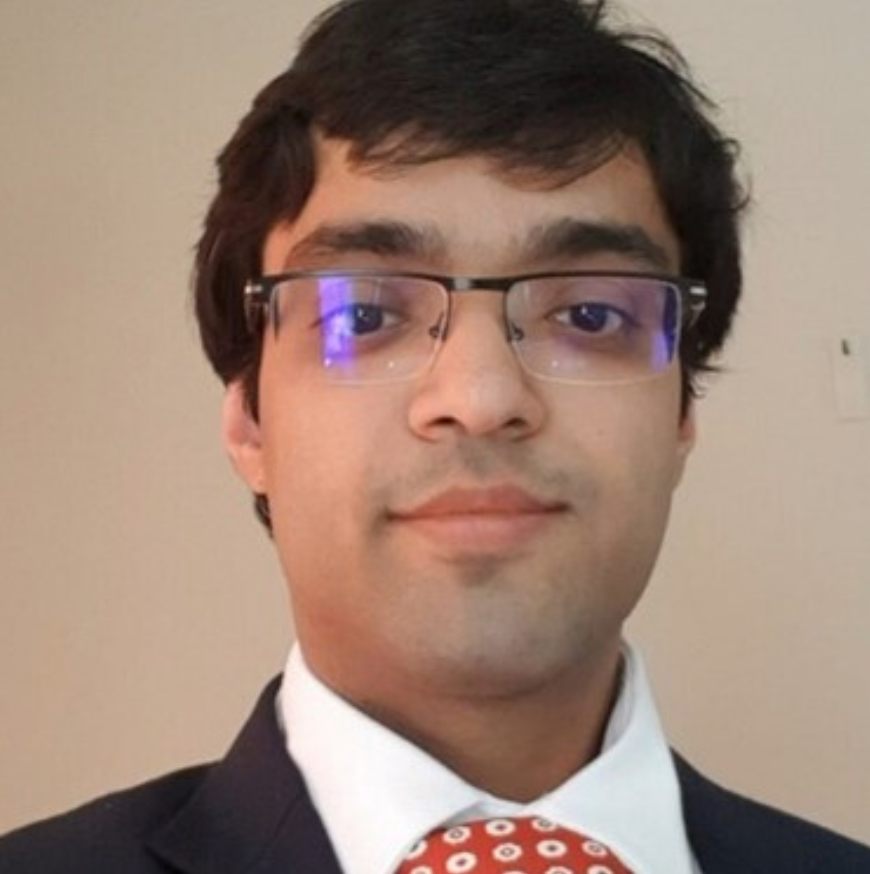
Abhinav Thakral, MBBS, MPH
Training Period: 2024-2026
Medical School: Maulana Azad Medical College
Residencies: University of San Francisco (2024-2026) - Brookdale Hospital Medical Center (2022-2024)
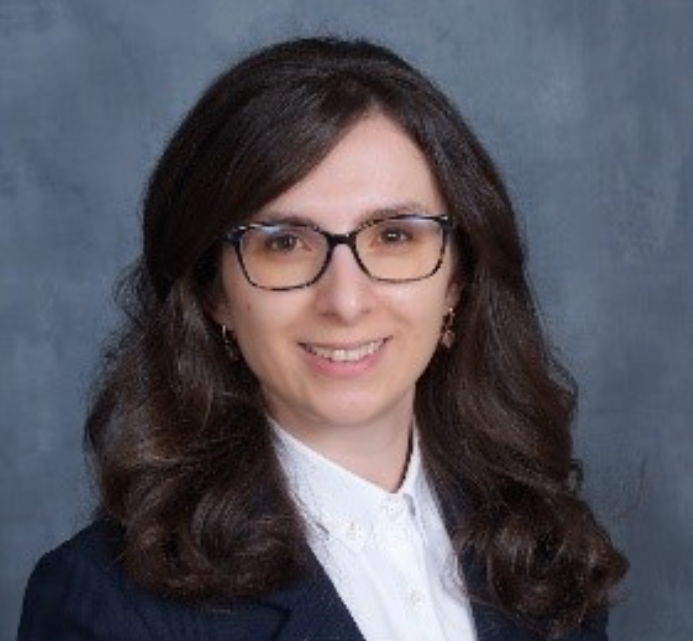
Ozlem Turedi, MD
Training Period: 2023-2025
Medical School: Meram Tip Fakultesi
Residencies: University of San Francisco (2023-2025) - University of Oklahoma (2022-2023)
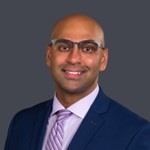
Rahaman Navaz Gangji, MS, MD, PHD
Training Period: 2022-2026
Medical School: Virginia Commonwealth University
Residency: University of San Francisco
Alumni
|
Jacob Hogue, MD |
Chief, Madigan Army Medical Center |
|
Teresa Sparks, MD, MAS |
Faculty, UCSF |
|
Victoria Berger, MD |
Maternal Fetal Medicine & Genetics, Sutter Health |
|
Daniah Beleford, MD, PhD |
Faculty, UC Davis |
|
Anne Mardy, MD |
Faculty, Dell Medical School |
|
Katherine Swanson, MD |
Faculty, UCSF |
|
Sabrina Cheng, MD |
Geneticist, SFJ Pharmaceuticals |
|
Melinda Mara Scully Noah, MD |
Maternal Fetal Medicine, Sutter Health |
|
Petra A. Swidler, MD |
Pediatrician, Confluence Health |
|
Priya Sekar, MD, MPH |
Clinical Research Physician, Astra Zeneca |
|
Grace Yoon, MD |
Faculty, University of Toronto |
|
John Yuhjung Tsai, MD |
Allergy, Kaiser California |
|
Ophir David Klein, MD, PhD |
Faculty and Director, Pediatrics, Cedars-Sinai |
|
Jonathan Holt, MD |
Hospitalist, Baptist Memorial |
|
Y. Katherine Bianco, MD |
Faculty, Maternal Fetal Medicine, Stanford |
|
Rashmi Jain, MD |
Internal Medicine, Kaiser California |
|
Karla Bermudez-Wagner, MD |
Faculty, Maternal Fetal Medicine, UCSF |
|
Ben Chung Li, MD |
Faculty, Maternal Fetal Medicine, UCSF |
|
Swetha Krishnamurthi, MD |
Geneticist, Kaiser California |
|
Ahmad Alhariri, MD |
Hospitalist, Southcoast Health |
|
Marwan Ali, MD |
Geneticist, Sutter Health |
|
Adnan Alsadah, MD |
Geneticist, Cleveland Clinic |
|
Teda Arunrut, MD, MS |
Pediatrician, Northeast Valley Health |
|
Bryce Mendelsohn, MD |
Geneticist, Kaiser California |
|
Aya Abu-El-Haija, MD, MPH |
Faculty, Boston Children's Hospital |
|
Thoa Ha, MD |
Maternal Fetal Medicine, Kaiser California |
|
Alicia Aycinena, MD |
Geneticist, Kaiser California |
|
Balram Gangaram, MD |
Geneticist, Valley Children's |
|
Jirat Chenbhanich, MD |
Faculty, Case Western Reserve University |
|
David Blair, MD, PhD |
Pediatrician, Kaiser California |
|
Monica Penon Portmann, MD |
Faculty, University of Washington |
|
Ria Garg, MBBS, MS |
Faculty, SUNY Upstate Medical University |
|
Divya Vats, MD |
Geneticist, Kaiser California |
|
Angie Jelin, MD |
Faculty and Asst. Director, Johns Hopkins |
|
Chung Lee, MD |
Faculty, Stanford |
Training Life
Sample Daily Schedule
|
Preclinical preparation on undiagnosed diseases, electronic records review |
|
8 am Outpatient genetics clinic to see referred patients |
|
9 am Team discussion with attending, genetic counselor |
|
12 pm Working lunch |
|
1 pm Inpatient consults |
|
3 pm Rounds, testing recommendations, family meetings |
|
4 pm Discussion with primary teams, triage |
|
Undiagnosed diseases rounds; genomic testing and result interpretation |
Life in the Bay Area
UCSF is located in the beautiful and vibrant city of San Francisco, where there is something new to explore on every block. A wide variety of cultures and communities make it a vibrant place to live. Galleries, restaurants, and running trails abound. The Parnassus campus is located in the Inner Sunset district, which is known for Golden Gate Park, one of San Francisco’s treasures. Mission Bay is the UCSF campus located right near the San Francisco Bay. University housing and a plethora of other living options are available. In addition, UCSF has many resources that promote personal growth and team spirit. A wide range of extracurricular activities is available, and UCSF offers state-of-the-art fitness facilities. The shuttle system makes transportation easy. There is always someplace new to explore in the Bay Area. For further information, visit these links:
